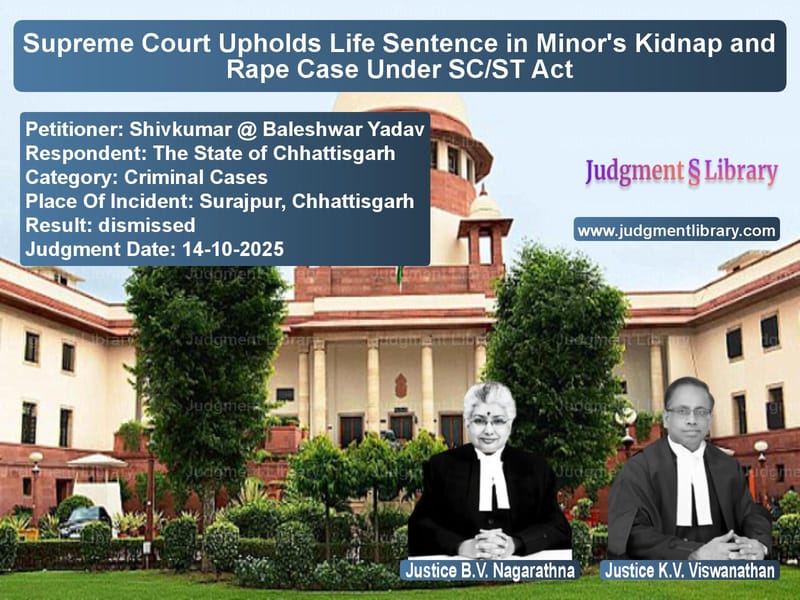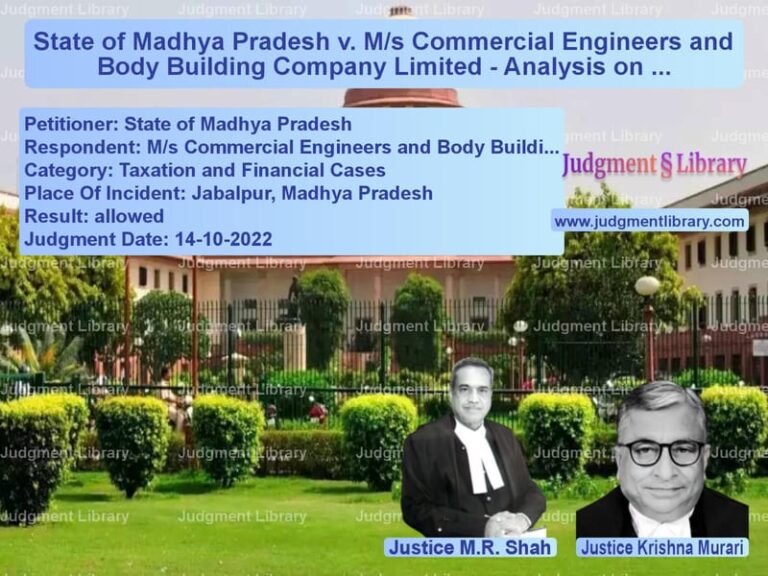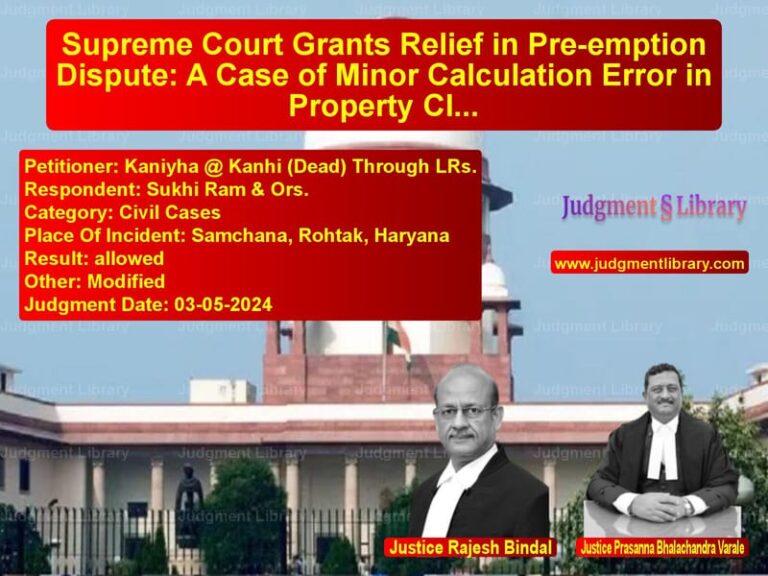Supreme Court Upholds Life Sentence in Minor’s Kidnap and Rape Case Under SC/ST Act
In a powerful affirmation of justice for the most vulnerable, the Supreme Court of India has upheld the conviction and life imprisonment of a man found guilty of kidnapping, raping, and intimidating a minor girl from a Scheduled Caste community. The case, which emerged from the Surajpur district of Chhattisgarh, involved a brutal crime that invoked multiple stringent laws, including the Protection of Children from Sexual Offences (POCSO) Act and the Scheduled Castes and Scheduled Tribes (Prevention of Atrocities) Act. The apex court’s judgment not only reinforces the legal protections for minors and marginalized communities but also offers crucial guidance on the evaluation of evidence, particularly concerning the age of the victim and the improper practice of declaring witnesses as ‘hostile’. The court meticulously examined the evidence, from the victim’s harrowing testimony to school records and medical reports, ultimately finding no merit in the appeal and dismissing it, thereby allowing the severe sentences imposed by the lower courts to stand.
The Prosecution’s Case
The incident unfolded on the night of May 10, 2018, in a village in Surajpur. The victim, a young girl referred to as ‘P’ in court documents to protect her identity, had just served dinner to her family. She then left her home to take food to her grandfather, who lived nearby. This simple, familial act was the last moment of normalcy before a terrifying ordeal began. According to the prosecution, the appellant, Shivkumar @ Baleshwar Yadav, was lying in wait near a Sendhwar tree. As the victim passed by, he grabbed her, pressed her mouth to prevent her from screaming, and threatened to kill her. He then took her to a forest area where he forcibly undressed her and committed sexual intercourse. After this, he took her to her maternal uncle’s house in a nearby village, leaving her there before returning later. It was during this return that the police, who had been alerted by the girl’s father, intercepted them and took them into custody.
The father, upon realizing his daughter was missing, had immediately filed a report, expressing suspicion against the appellant, who was known to them. Based on his complaint and the subsequent recovery of the girl, the police initially registered a case of kidnapping under Section 363 of the Indian Penal Code (IPC). As the investigation progressed and the victim’s statement was recorded, more serious charges were added, including rape (Section 376 IPC), kidnapping for illicit intercourse (Section 366 IPC), criminal intimidation (Section 506 IPC), and relevant sections of the POCSO Act and the SC/ST Act, given the victim’s status as a minor and a member of a Scheduled Caste.
The Trial and the Evidence
The trial court, after examining 19 witnesses and numerous pieces of evidence, found the appellant guilty on all counts. The most compelling evidence came from the victim herself, who was examined as PW-2. Her testimony was clear, consistent, and unwavering, even under cross-examination. She detailed the sequence of events—from being grabbed near the tree, threatened, taken to the forest, and subjected to sexual assault. Her statement was corroborated by her earlier recorded statement under Section 164 of the Code of Criminal Procedure.
A critical aspect of the case was establishing the victim’s age to confirm she was a minor, which would trigger the stringent provisions of the POCSO Act. The prosecution presented the school admission register, seized under Exhibit P-11 and marked as Article B/C in court. The register, maintained by PW-9, a school teacher, clearly recorded the victim’s date of birth as September 15, 2004, making her 13 years old at the time of the incident in May 2018. The Supreme Court placed strong reliance on this document, citing its own precedent. The Court held, “A register maintained in a school is admissible in evidence to prove date of birth of the person concerned in terms of Section 35 of the Evidence Act. Such dates of births are recorded in the school register by the authorities in discharge of their public duty.” The Court found the evidence of the father and the teacher, supported by the register, to be wholly reliable in proving the victim was a minor.
The medical evidence, presented by Dr. Suchita Nirmala Kindo (PW-10), further solidified the prosecution’s case. The doctor testified to finding a fresh injury on the victim’s hymen, indicating forceful intercourse. Forensic reports confirmed the presence of semen on the victim’s underwear and on the underwear of the appellant, establishing a direct physical link to the crime.
A Critical Judicial Observation on Hostile Witnesses
A significant part of the Supreme Court’s judgment was dedicated to criticizing the prosecution’s handling of the victim’s father, who was declared a ‘hostile’ witness. The father, PW-1, had corroborated the prosecution’s story in his examination-in-chief. However, the prosecutor, for reasons the Supreme Court found baffling, sought and was granted permission to cross-examine him as hostile over minor inconsistencies. The Court expressed strong disapproval of this practice, calling it an “extraordinary phenomenon” that should not be used casually.
The Court elaborated on the legal principle, stating, “The contingency of cross-examining the witness by the party calling him is an extraordinary phenomenon and permission should be given only in special cases… the Court, before permitting the party calling the witness to cross-examine him, must scan and weigh the circumstances properly and should not exercise its discretion in a casual or routine manner.” The Court emphasized that merely because a witness speaks a truth that is inconvenient for the prosecution does not make them hostile. It found that the father’s testimony was largely consistent with the prosecution’s case and that there was no valid reason to declare him hostile.
Applicability of the SC/ST Act
One of the key arguments in the appeal likely pertained to the conviction under Section 3(2)(v) of the SC/ST Act, which carries a punishment of life imprisonment. This section requires that the offender, not being a member of an SC/ST, commits a serious offence punishable with ten years or more imprisonment against an SC/ST person, knowing their caste. The Supreme Court noted that the section was amended in 2016, and post-amendment, the threshold for proving the offence was lowered. It is no longer necessary to prove the crime was committed because of the victim’s caste; mere knowledge of the caste is sufficient.
Furthermore, the Court invoked Section 8(c) of the SC/ST Act, which creates a legal presumption. The Court noted, “Section 8(c) of the SC/ST Act clearly indicates that the acquaintance of the accused with the family of the victim is enough to presume that the accused was aware of the caste and identity of the victim, unless proved otherwise.” In this case, the evidence clearly showed that the appellant was a neighbour, frequently visited the victim’s house, and was well-acquainted with the family. The victim also testified that he knew her caste. The Court found nothing on record to rebut this presumption, confirming that the conviction under the SC/ST Act was fully justified.
The Supreme Court’s Final Verdict
After a thorough analysis of the evidence, the Supreme Court found no reason to disagree with the concurrent findings of the trial court and the High Court. The testimony of the victim was found to be credible and trustworthy, the school register conclusively proved she was a minor, the medical and forensic evidence supported the fact of sexual assault, and the requirements of the SC/ST Act were fully met. The Court dismissed the appeal, upholding the sentences imposed by the trial court, which included life imprisonment for the offence under the SC/ST Act and ten years of rigorous imprisonment for rape under the IPC and POCSO Act, with all sentences to run concurrently.
This judgment serves as a stern reminder of the judiciary’s commitment to protecting children and marginalized sections of society. It underscores the importance of a sensitive and principled approach to evaluating evidence, especially in heinous crimes where the victim’s voice must be heard and believed. By upholding the life sentence, the Supreme Court has sent a powerful message about the severe consequences of such brutal acts.
Petitioner Name: Shivkumar @ Baleshwar Yadav.Respondent Name: The State of Chhattisgarh.Judgment By: Justice B.V. Nagarathna, Justice K.V. Viswanathan.Place Of Incident: Surajpur, Chhattisgarh.Judgment Date: 14-10-2025.Result: dismissed.
Don’t miss out on the full details! Download the complete judgment in PDF format below and gain valuable insights instantly!
Download Judgment: shivkumar-@-baleshwa-vs-the-state-of-chhatti-supreme-court-of-india-judgment-dated-14-10-2025.pdf
Directly Download Judgment: Directly download this Judgment
See all petitions in Rape Cases
See all petitions in SC/ST Act Case
See all petitions in Judgment by B.V. Nagarathna
See all petitions in Judgment by K.V. Viswanathan
See all petitions in dismissed
See all petitions in supreme court of India judgments October 2025
See all petitions in 2025 judgments
See all posts in Criminal Cases Category
See all allowed petitions in Criminal Cases Category
See all Dismissed petitions in Criminal Cases Category
See all partially allowed petitions in Criminal Cases Category







